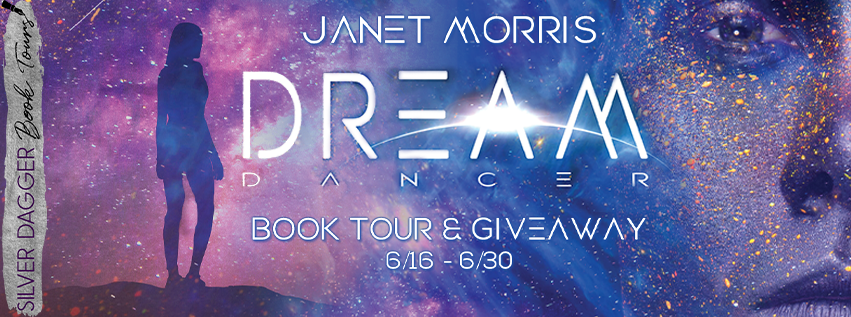Dream Dancer (Kerrion Empire Book) Epic SciFi Fantasy Adventure by Janet Morris ➱ Book Sale with Rafflecopter
The universe called.
She answered.
Everything you've seen or read till now took you only to the brink . . .
Dream Dancer
Kerrion Empire Book 1
by Janet Morris
Genre: Epic SciFi Fantasy Adventure
The universe called. She answered.
Everything you've seen or read till
now took you only to the brink . . .
Neither
pure fantasy, nor straight science fiction, nor earthbound dynastic
saga, Dream Dancer is a stunning amalgam of all three. It is a family
saga with the epic appeal of Dune and the action and excitement of
Star Wars. It is a saga of love, power and treachery that will appeal
to men and women equally; full of action, compulsively readable and
quite unlike anything being published in the realms of fantasy
today.
The
heroine, Shebat, is a remarkable girl from Earth. She is brought to
the vast empire of the Kerrion family by a renegade son; named as its
future ruler on a whim of his autocratic father; abducted to the
slums where the Kerrions' slaves drug themselves with powerful
mystical sorcery; and finally rescued to take part in a great
rebellion. She falls in love with one brother but marries another and
becomes more Kerrion than some born to the name. A magical seductress
of men, passionate in her lust for power, Shebat moves among those
who control the destinies of millions, for whom treachery and
betrayal are as easy as murder. Set in the timeless future on a
primitive, savage Earth and on the sophisticated habitats of deep
space, Dream Dancer is the first volume of a three-part saga.
"Not
since Dune have we witnessed a power struggle of such awesome
intensity. Dream, Dancer may well be the I, Claudius of fantasy
novels. A literary feast!" -- Eric Van Lustbader, author of The
Ninja.
"Dream
Dancer is a fascinating and lyrical story, told with great invention"
-- Peter Straub, author of Ghost Story.
"The
pacing is brisk; fascinating concepts abound." -- Booklist
**The Kerrion Empire series is Perseid Press' featured series for June and is on sale for Only $2.99 on kindle!!**
Amazon * B&N * Bookbub * Goodreads
A.D.
2248:
On the day after the killer frost took a ready harvest, a trio of cloaked
enchanters came riding into Bolen’s town, New York, on froth-dappled black
horses whose brasses shone like the sun.
There were plenty of folk to remark on the
sight, lounging around on board sidewalks and split-rail fences with dour faces
and bellies bloated from too much beer and too little food, as folk will when
tragedy herds them together, and suddenly there is nothing left to do.
The three horses kicked up dust from one
end of the single street in sere Bolen’s town to the other. The dust tickled
the noses of the townfolk above their kerchiefs; the awkward scats and
unfamiliar scarlet eagles blazoned on the black cloaks of the riders tickled
their curiosity. And the fact that the dust did not seem to settle on the shiny
black boots of the riders kicked up suspicion in one man’s mind that these must
be the enchanters who had caused the demon frost to strike down their crops.
The suspicion, once voiced, spread through
the ragged crowd like dust on the wind, touching one, touching all, uniting
them in a heady rebirth of the purpose.
These were the culprits who had brought
the ill fortune, all agreed.
In a mass of nearly thirty, the people of
the town advanced down its single street to Bolen’s inn, the ramshackle way
station around which the town had grown up and its most imposing building,
being possessed of not only a cellar, but an upper floor.
The three horses snorted and skittered as
the rumbling crowd approached, but their riders had entered the inn, and their
reins held them fast to the porch rail.
Inside the inn one of the enchanters, who
was tall and well made yet somehow lissome in skin-hugging ebony coveralls
relieved with scarlet, pulled back a curtained window. He said something that
lilted through his black beard in a language neither fat Bolen nor the
uncombed, pinch-faced girlchild waiting sullenly upon the strange ones’ table
understood. The second man, whose presence it was that made the first seem delicate
by the force of his impact and the width of his neck, answered and left the
enchantress with whom he had been sitting to disappear through the door.
The enchantress furrowed her creamy brow,
brushed an auburn wisp from it, and smoothed her coveralls down over her hips.
Then she gave an unmistakable order to the lissome, slighter man, who looked
displeased and scratched in his beard, but seemed to obey. At least, he
approached the bar.
The barefoot serving girl, watching the
first man cross the floor to where Bolen fastidiously wiped tankards behind the
bar, tugged at her patched shift and straightened her shoulders in emulation of
the regal woman with the shining, chestnut coif. She tried to imagine her black
tangles magically straightened, shining like brass. She failed; she sighed.
“Is there another way out of here?” asked
the bearded one of Bolen in a clipped, oddly accented voice as from without the
rumble of the crowd grew louder.
“My pardon, gentle sir, but there is not,”
said Bolen carefully, all his chins bobbing in agreement. Everyone knew the
dangers of deceiving enchanters. But the crowd wanted this lot. Should Bolen
deny them, this would be Bolen’s town no more and Bolen himself would be stoned
alongside the strangers when they were caught. He was trying to figure out a
way to claim their horses when the rumble turned to thunder and the windows
shattered in a rain of stones and the door came bursting inward, all the town
behind.
The lithe man at the bar whirled around,
seemed to arch back like a mountain cat. But even as he did the woman went down
clutching her bleeding head, and he hesitated, stunned disbelief giving him a
moronic, slack-jawed mien. Then the ragged girl was pulling at him, babbling
too fast in a tongue he had superficially learned, dragging him toward the
kitchen whence she had first emerged.
A rock caught him as he ducked beneath the
curtain, numbing his arm. Then her strong little fingers grabbed at his beard,
pulling it violently, and he realized he had not been deciphering her words,
only hearing another compendium of unintelligible sounds.
“Get down. Through here. Crawl. Oh, go
on!”
“You first,” he said grimly, pushing her
ahead of him.
He pushed too hard, so that she tumbled
down, and he recollected the frail, knobby backbone he had felt through the
shift, and the gray, maelstrom eyes pleading, even as he picked up a stained
kitchen knife and prepared to take a few of them with him.
But as a toil-roughened hand clutched the
curtain from beyond, another clutched his ankle, jerking desperately. Off
balance, he went to his knees. The waif’s heart-shaped face gleamed out at him
from the dim passage. “Please, please, or they will kill me too.”
Thrusting the knife through his belt, he
crouched low. Wedging himself into the waist-high passage, he pulled shut the
door.
Then there was nothing left but to follow
the scuttling sounds ahead of him in darkness. Suddenly, there was a crack of
light.
“Your horses,” the girl’s husky voice
announced with obvious pride, “are yet waiting. Will you take me with you?”
“I cannot.”
“You cannot leave me to their mercy!” Full
lower lip grew fuller as determination turned pout to accusation.
“They are your people,” he fended her off,
fidgeting now that escape was so close. A ridiculous vision of this tangled,
odorous primitive garbed in Kerrion flight satins made his grin flash in the
semidark.
“Then I will make a diversion for you,”
she offered dully. “Take which direction you choose and I will take another.”
From such selfless courage, Marada Seleucus
Kerrion could not turn away.
He rubbed his elbow, flexing his arm which
was no longer complaining quite so bitterly, and wondered whether he might not
be still dreaming off last night’s revel and all this the wages of
incontinence. “No,” he sighed. “Come on then, small person, and if we reach the
horses we will head them both the same way.”
“Aieeee,” crowed the girl in triumph,
lunging through the half-door into the dusty street.
Later, he thanked the clouds that on this
benighted world never lessened, and the cover it threw over the racing sprite,
all knees and elbows, who by the time he reached her had two pairs of reins
free and was trying with no success to mount the tall, dancing horse.
He boosted her up and scrambled atop a
second quivering snorter, while from Bolen’s inn came howls and crashings and
one man’s tortured scream rose above the rest.
“Bolen,” the girl gasped, full lips blue
with terror.
“Too bad,” said the man bleakly, for his
eyes had seen his broken companion all askew on the steps. “That way,” he said
pointing, and slapped his horse’s rump.
There followed a nightmarish interval of
leaves slapping him and branches raking him and pine needles seeking to blind
him as the horse plunged wildly through the thicket behind Bolen’s inn. By the
time he had gained control, Bolen’s town was far behind. The thicket became a
copse, the copse gave way to forest. It was not until then he looked around to
see if the rat-haired waif yet followed.
She did. She rode badly, though perhaps
not as badly as he, and when they had been awhile in the lofty, dank trees he
called a halt more for her than for the horses.
So there he was, walking a sweating horse
in an alien glen with a more alien child whose disposition was easily as much a
problem as his own would be to his superiors when all this came to light.
He scraped foam off the horse’s neck and
tightened the girth, watching her. She was painfully thin, except for her
belly. Malnutrition? Her shoulders were sharp, boyish, a distinct contrast to
wise, woman’s eyes that dominated a child’s face. Was that why he had
succumbed, brought her along? No, she was not that pretty, or that pathetic.
She was humming as she rubbed her horse
with dead leaves.
“How old are you?” While he spoke he
prodded a bracelet on his wrist. It sang briefly. He took his hand away.
“Seventeen.” She spoke sharply in an
impossibly low voice. A shift of the wind brought her pungent odor to him like
a warning. But it was too late to heed it. He was committed. And she was lying.
“Truly,” he demanded.
“Fifteen.” She turned to regard him,
letting the leaves fall from her hand. The horse snorted, nuzzling her. She
patted its muzzle absently, looking up at him from under the ebon froth that
framed her face. Grass and dust hung in its thicket. The eyes, below, said:
“You can’t blame me for trying.”
“Was Bolen your father?”
“No,” very softly. “My parents are dead.”
“Where would you like to go? Do you have
relations, perhaps in the city?” He made his play casually, hoping she would be
content, would let him off, take the horse and some money . . .
“No relations. I want to go with you.” The
pale gray eyes had thick black lashes. They came together, and the man found he
had been holding his breath while she looked at him as if he could hold his thoughts
withal.
“No, you do not. You do not even know
where it is I am going.” How could he explain to her that in the Consortium he
served, she would be an object of ridicule, an oddity at which people would
wrinkle their noses and turn away. He wondered if the malodor was congenital,
as the wind brought it to him again.
“I do not care. I have no place else to
go,” she shrugged. “I will serve you as I served Bolen. You will be pleased
with me.”
He did not want to think about how she
might have been serving Bolen, or might think to serve him. “Time to ride,” he
said.
“I can do some small enchantments,” she
proclaimed.
“Then enchant yourself up on that horse.”
He mounted and in doing so felt the jab of
the kitchen knife. He took it from his belt. It was low-quality iron, crudely
smelted. He threw it down. It stuck, wavering point-deep in the sod.
His elbow, still tender, objected, and he
tried to credit the evanescent pain with having caused the catch in his throat.
But he knew it was something else, something composed of black iron and
unceasing clouds and enchantments and little girls in rags who stunk. From this, the mighty Consortium which ruled
the stars was sprung?
“What is your name?” he asked, turning the
horse deeper into the forest at an easy walk.
“Shebat,” she said hesitantly, giving up a
great secret.
“Marada,” he introduced himself, leaving
out all the rest which she would not understand, which made no sense here in
this forest of forgetfulness on the world of his private dreaming.
Marada had come home, across vast reaches
of lucent space, despite the fair warnings and suddenly sensible restrictions
that prohibited landfall on the planet Earth.
His older brother and his betrothed,
Iltani, would never leave it. He remembered Iltani’s arch challenge: “How bad
can it be?” She had found out. But it was not her fault, rather it was his, his
alone; his the obsession and his the price to pay.
“You are
an enchanter,” Shebat breathed in fearful delight when she saw the little
opalescent reconnaissance ship, perched like a stalking mantis in a sorcerer’s
seared circle in the verdant meadow. “I was afraid you might not be, after
all.”
His horse’s reaction was quite another
matter. By the time he had it calmed and stripped and turned loose in the clearing,
the moment had passed to deny sorcery. Watching the little girl kiss the horse
on his slobbery muzzle, he wondered whether there might not be something for such a one to do in the
far-flung empire of the Consortium he served.
“You are sure you would not rather go to the city, apprentice at some trade?
I will give you money, secure you a position. You can grow up to be the
Enchantress of all the Earth.” He had to kneel down to see her face, for she
would not look at him. He took her by the arms, but she only repeated that she
had nowhere to go and wanted to be with him.
So he took her onto the ship and showed
her how to strap in, and soon there was nothing left in the dim clearing but a
patch of seared ground and harness for two horses, and the beginnings of a
legend that the townfolk—peering through the bushes but afraid to face the
mighty enchanter, whose fire-spouting chariot rose on a deafening roar almost
straight into the heavens—would tell to their friends and relations and to
their children and their children for generations to come.
What is
something unique/quirky about you?
I breed Morgan
horses. I consult with Morgan breeders to help them choose breeding
combinations to achieve a desired result.
I am also a song
writer; I play bass guitar with my husband Chris who sings and plays guitar. We
have an album on MCA records. Look for Christopher Crosby Morris on Soundcloud
or N1M.com
Can
you, for those who don't know you already, tell something about yourself and
how you became an author?
I wrote my first
novel, High Couch of Silistra in 1975; a friend sent it to
an agent who chose to represent me; I had already written the second book in
the Silistra Quartet and my agent told me not to disclose that until they
finalized the contract for the first one. When the publisher learned of the
others, Bantam Books bought the succeeding three. When the fourth book was published,
the series already had four million copies in print. Suddenly I was a novelist
specializing in environmental, gender, historical and political subjects. In
the process, Chris became my editor and ultimately a co-writer. Since then, we have
co-authored many books.
Who is your
hero and why?
Heraclitus of
Ephesus, a pre-socratic philosopher, whose Cosmic Fragments
foreshadow our knowledge of reality and how to perceive it. Among his precepts
is the statement that change alone is unchanging. I’ve worked Heraclitus’
fragments in here and there throughout our books.
Which of
your novels can you imagine being made into a movie?
All of them. I write
cinematically, our books are vivid adventures I undertake without knowing the
destination. I, the Sun, The
Sacred Band, and Outpassage are particularly suited to film.
The Threshold Series is a feast of opportunities for today’s
special effects creators.
What
inspired you, to write Dream Dancer?
Like the rest of
my generation, I was inspired by the rapid development of computer technology
and the thought that it might become sentient one day. I began to imagine how
it would be to put our trust in machines to take us far beyond our own human
reach. Dream Dancer is that story.
Convince us
why you feel Dream Dancer is a must read.
Dream
Dancer is an
exploration of a far future human culture that has developed artificial
intelligence to a point where space-faring ships pilot themselves through
regions of space where time is fluid and human navigational skills are ill-suited.
However, these smart ships need a biological clock as a check on their purely
mechanistic capabilities and therefore need to partner with trusted human pilots
to enter and exit these fluid regions called spongespace. Shebat, our
protaganist, is a practioner of primitive magic arts and is uniquely gifted, a
quality which, when combined with her omniscient spacecraft takes an entire
culture where it has never been.
Who
designed your book covers?
Most of my
covers, including Dream Dancer, are realized by Roy Mauritsen, a
gifted graphic artist.
Advice to
writers?
As for advice
to writers, here is all I know: write the story you want to read. Start at the
beginning, go to the end, and stop. Seriously. From start to finish you must inhabit
the construct in a manner that makes the reader choose to continue; if I, as
the writer, can’t feel what it’s like being there, my readers can’t either. So
close your eyes, look at your feet where they are standing on the story’s
ground; tell me what you see. Tell me what you hear. Ask at the end of each
paragraph ‘what happens next?’. If you lose touch with it, wait until you’re
back inside it. Tell the story that comes to you, and from you, to me.
Best selling author Janet Morris began writing in 1976 and has since published more than 30 novels, many co-authored with her husband Chris Morris or others. She has contributed short fiction to the shared universe fantasy series Thieves World, in which she created the Sacred Band of Stepsons, a mythical unit of ancient fighters modeled on the Sacred Band of Thebes. She created, orchestrated, and edited the Bangsian fantasy series Heroes in Hell, writing stories for the series as well as co-writing the related novel, The Little Helliad, with Chris Morris. She wrote the bestselling Silistra Quartet in the 1970s, including High Couch of Silistra, The Golden Sword, Wind from the Abyss, and The Carnelian Throne. This quartet had more than four million copies in Bantam print alone, and was translated into German, French, Italian, Russian and other languages. In the 1980s, Baen Books released a second edition of this landmark series. The third edition is the Author's Cut edition, newly revised by the author for Perseid Press. Most of her fiction work has been in the fantasy and science fiction genres, although she has also written historical and other novels. Morris has written, contributed to, or edited several book-length works of non-fiction, as well as papers and articles on nonlethal weapons, developmental military technology and other defense and national security topics.
Janet says: 'People often ask what book to read first. I recommend "I, the Sun" if you like ancient history; "The Sacred Band," a novel, if you like heroic fantasy; "Lawyers in Hell" if you like historical fantasy set in hell; "Outpassage" if you like hard science fiction; "High Couch of Silistra" if you like far-future dystopian or philosophical novels. I am most enthusiastic about the definitive Perseid Press Author's Cut editions, which I revised and expanded.'
Website * Facebook * Twitter * Instagram * Bookbub * Amazon * Goodreads
Follow the tour HERE for special content and a giveaway!
$10 Amazon










The excerpt sounds really good. I like the cover.
ReplyDelete